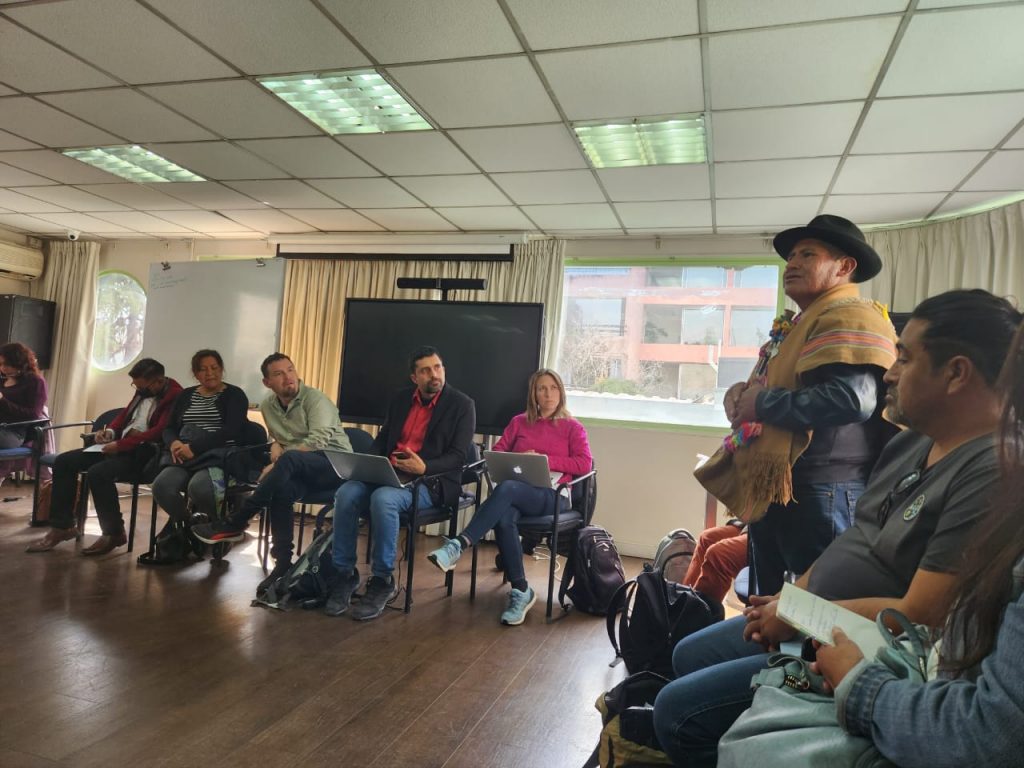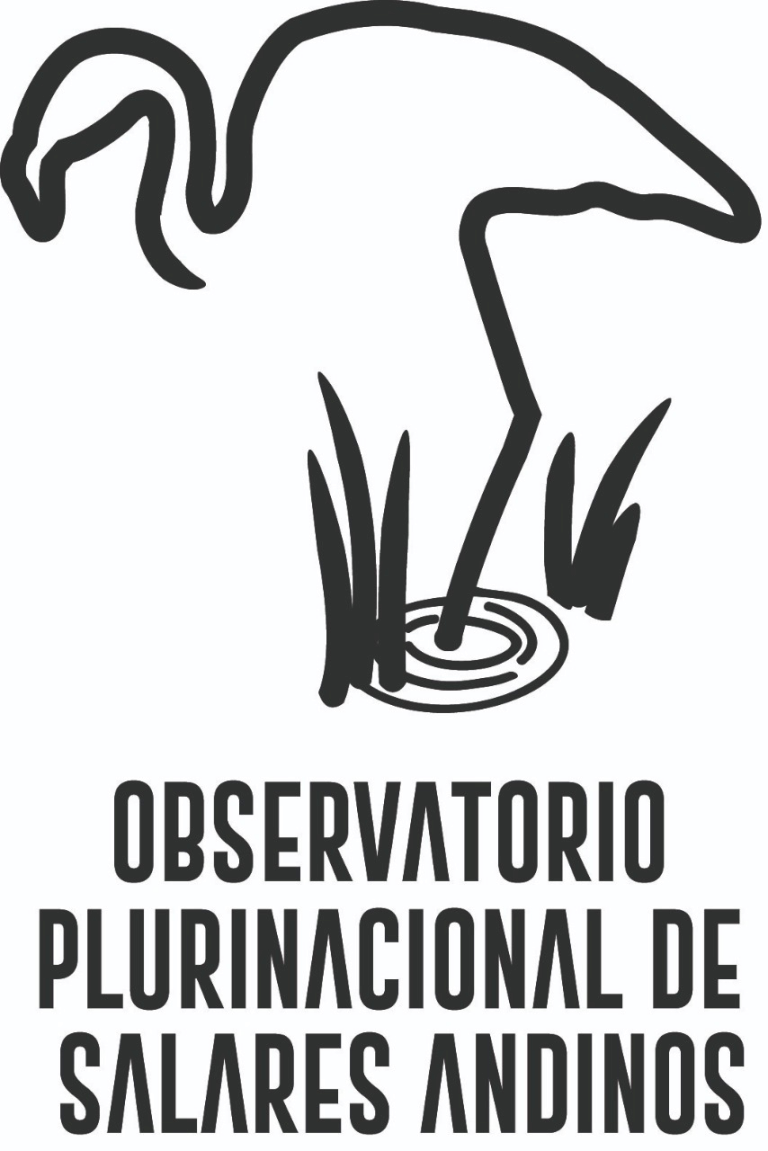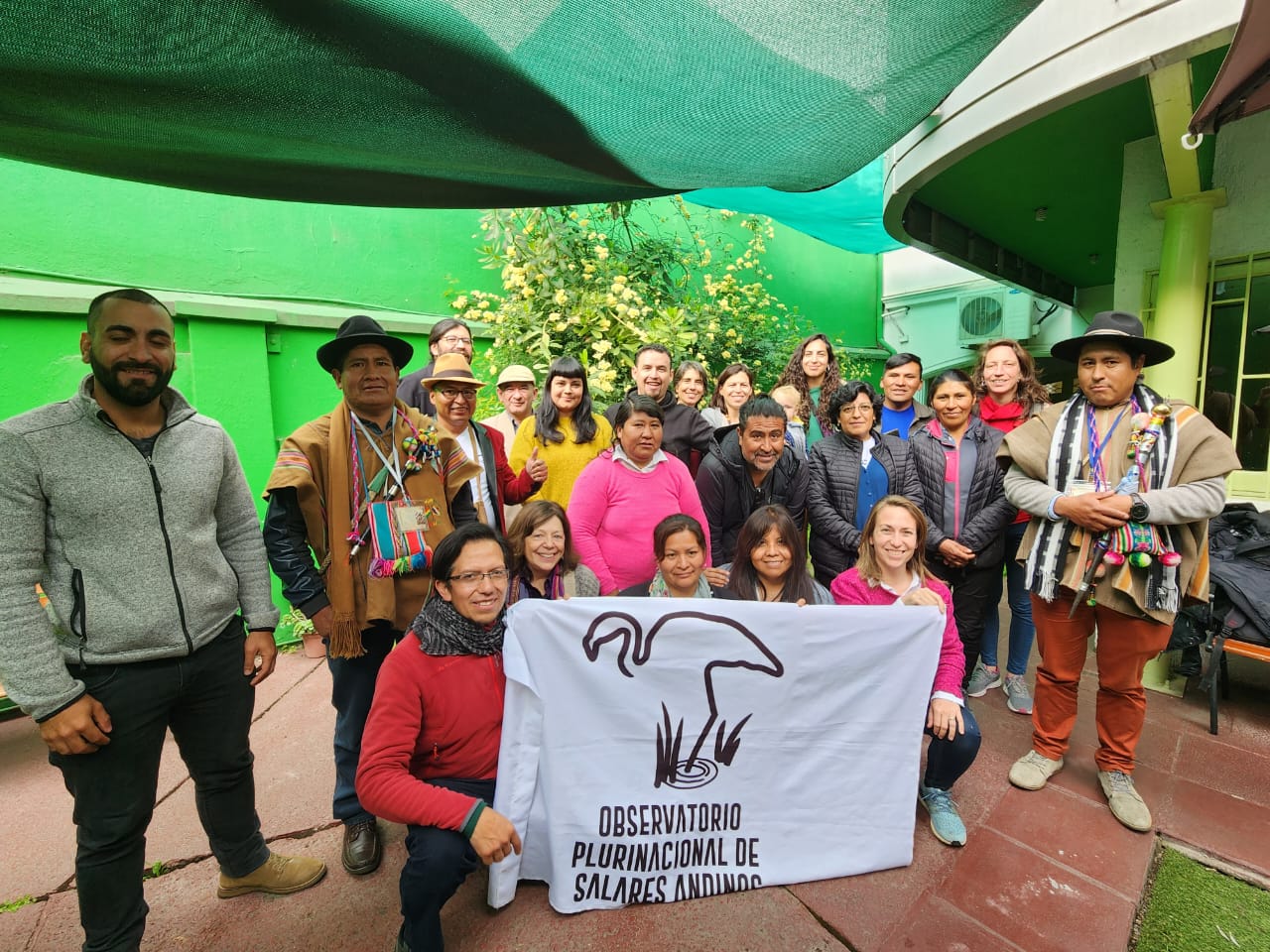More than 20 social organizations, experts and representatives of indigenous communities of the Andean highlands of Chile, Bolivia and Argentina participated in the II Plurinational Meeting for the Andean Salt Flats and Wetlands organized by the Plurinational Observatory of Andean Salt Flats (OPSAL in Spanish), the Environment and Natural Resources Foundation (FARN) and Fundación Tantí, which took place on Friday 23 and Saturday 24 September at the offices of the Heinrich Böll Cono Sur Foundation located in Santiago, Chile.

During the event, the participants made an assessment of the progress of the lithium extraction industry in the salt flats and wetlands of the Andean altiplano or Puna during the pandemic and regarding the impacts generated by mining in these ecosystems that concentrate near 65% of the world’s reserves of the so-called «white gold”.
«In the recent years we have seen the emergence of new lithium mining projects and an expansion of existing projects in response to the electromobility market, one of the main climate change mitigation strategies proposed by the global climate agenda, which continues to be based on the development of mining and extraction, to the detriment of surrounding communities and biodiversity,» says Ramón Balcázar, director of Fundación Tantí and OPSAL Coordinator in Chile.
In the political, social and economic context of the three countries and of Latin America as a whole, nationalization has also been addressed as a way of ensuring that active capital does not escape the region, with a greater presence of the State as in Bolivia or the project to create the National Lithium Company in Chile. However, Vivian Lagrava, coordinator of OPSAL in Bolivia, appreciates that the industry is not completely in the hands of foreign companies, she maintains that even if the industry is nationalized, the rights of the communities are currently being violated under any type of resource control system that has been put in place.
«Mining companies have been in the communities and territories for decades, but their living conditions have not improved, since there is no binding prior consultation with the communities, or if there is, it is only a formality and has no impact. What the Lípez Nation is experiencing is a very serious example of how extractivism under government protection continues to violate the rights of native peoples in Bolivia, despite having a constitution that incorporates the guarantee of rights. This, accompanied by a concealment of information, and a history of governments that continue to make invisible the fact that the communities are running out of water», explains the member of the Human Rights Collective Empodérate in Potosí and OPSAL.

The challenges in the territories and at regional and international level was another of the topics addressed at the meeting. Laura Castillo from the Environment and Natural Resources Foundation (FARN) highlighted the participation of territorial organizations and communities in the meeting. «There are many of us who are accompanying and supporting the work that organizations and communities carry out in the territories, and it is essential to have spaces for meetings to develop strategies and advocacy”, explains.
«In addition, we build alliances and realize that we are not alone in this. We strengthen ties between the three countries to stop the advance of lithium extraction, which today threatens the livelihoods of communities, and the global impacts generated by mining», she adds.
Verónica Gostissa, coordinator of OPSAL Argentina, emphasizes that this meeting is necessary to continue with an agenda to make the conflicts in the different territories visible in the national and international agenda: «The impacts of lithium extraction are beyond borders, this problem is regional, it is in an area that is being plundered and emptied, because the water is in dispute. Also, it is a global problem because the extraction of lithium benefits and delivers wealth to foreign companies in response to a consumer demand that comes mainly from other continents».
Finally, the also member of the Pucara Assembly in Catamarca emphasizes that this is a problem of the present: «today the communities are running out of water, today we must take action, not tomorrow».
To learn more about the conflicts surrounding the extraction of lithium and the installation of its mining industry in Bolivia, Chile and Argentina, we invite you to download the book «Salares Andinos – Ecología de Saberes por la Protección de Nuestros Salares y Humedales» and to participate in the free online screening of the documentary «El agua vale más del litio» at the Global Extraction Film Festival 2022 from October 26 to 30.

Organizations, indigenous community leaders and researchers participating in the II Plurinational Meeting for the Andean Salt Flats and Wetlands
Alicia Chalabe-Comunidades de Salinas Grandes, Jujuy y Salta Argentina.
Ángel Arjona- Comunidades de Salinas Grandes, Jujuy Argentina.
Bárbara Jerez- Universidad de Concepción, Concepción Chile.
Bruno Fornillo- Grupo de Estudios en geopolítica y Bienes Comunes (GYBC), Argentina.
Edson Muraña Flores- Pueblo nación Nor Lípez, Villa Mar Bolivia.
Edwin Ramos Lopez- Pueblo nación Nor Lípe, Villa Mar Bolivia.
Elena Rivera- Comunidad Indígena Colla de Copiapó, Copiapó Chile.
Elizabeth Mamani- Pueblo Atacameño Altiplano, Antofagasta de la Sierra Catamarca, Argentina.
Estela Veronica Benicio- Pueblo Originario Atacameño, Salta Argentina.
Freddy Viñales- OPSAL, Calama Chile.
Gonzalo Mondaca- Centro de Información y documentación Bolivia (CEDIB), La Paz Bolivia.
Jorge Campanini- Centro de Información y documentación Bolivia (CEDIB), Cochabamba Bolivia.
Laura Castillo-Fundación Ambiente y Recursos Naturales (FARN), Buenos Aires Argentina.
Lesly Muñoz- Comunidad Indígena Colla de Copiapó, Copiapó Chile.
Matilde López Muñoz- Universidad de Chile, Santiago Chile.
Mel Argento- Grupo de Estudios en geopolítica y Bienes Comunes (GYBC), Argentina
Nestor Omar Ruiz- Asamblea ambiental de Jujuy: Juntos Podemos en un ambiente sano.
Nicolassa Hoyos- Pueblo Atacameño, Salta Argentina.
Nicole Vivanco- Fundación Tantí, Valparaíso Chile.
Patricia Marconi- Fundación Yuchan, Salta Argentina.
Pía Marchegiani- Fundación Ambiente y Recursos Naturales (FARN), Buenos Aires Argentina.
Ramón Balcazar- Fundación Tantí, San Pedro de Atacama Chile.
Roly Morales, Municipio de Coipasa, Salar de Coipasa Bolivia.
Rudecindo Espíndola- Comunidad Lickan Antay de Toconao y Asociación de Agricultores de la Quebrada de Soncor, San Pedro de Atacama Chile.
Telye Yurisch- Fundación Terram, Santiago Chile.
Veronica Chavez- Pueblo Colla, Jujuy Argentina.
Verónica Gostissa- Pucara, Pueblos Catamarqueños en Resistencia y Autodeterminación, Catamarca Argentina.
Vivian Lagrava- Empodérate, Colectivo de Derechos Humanos, Potosí Bolivia.
About OPSAL
The Plurinational Observatory of Andean Salt Flats is a collaborative, supportive and horizontal space that promotes the protection of salt flats and other high Andean ecosystems, the safeguarding of indigenous rights and ways of life of the communities that inhabit them. It was born as a response to the widely spread «lithium triangle» as an extractivist territoriality that produces a global eco-capitalist imaginary on the Andean territories of the Southern Cone, spaces that are targeted by lithium mining companies to exploit the salt flats of this transboundary region shared between the North of Argentina and Chile with the Bolivian South.

